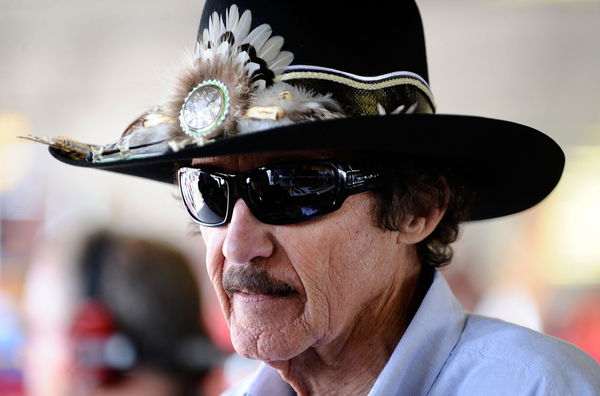
via Getty
WATKINS GLEN, NY – AUGUST 06: Team owner Richard Petty stands in the garage during practice for the NASCAR Heluva Good! Sour Cream Dips at The Glen on August 6, 2010 in Watkins Glen, New York. (Photo by Jeff Zelevansky/Getty Images for NASCAR)

via Getty
WATKINS GLEN, NY – AUGUST 06: Team owner Richard Petty stands in the garage during practice for the NASCAR Heluva Good! Sour Cream Dips at The Glen on August 6, 2010 in Watkins Glen, New York. (Photo by Jeff Zelevansky/Getty Images for NASCAR)
NASCAR is 76 years old. Across these almost 8 decades, the France family has weathered several storms, morphed the sport, and raised it into a multi-billion dollar enterprise. Its marketing department is expanding its horizons every day. The sport spent around US$5 million on the ‘NASCAR: Full Speed’ docuseries, which has brought a global audience. Then a $7.7 Billion media rights deal in 2023 meant even more commercialization – but Richard Petty is not so fond of that.
The ‘King’ is a true legend of the sport, having established a legacy of excellence. His 200 Cup race victories and 7 Cup Series championships make him one of the best stock car racers. However, these achievements were fetched at a time when NASCAR was more about racing and less about marketing.
Richard Petty looks back longingly at old times
ADVERTISEMENT
Article continues below this ad
Cale Yarborough got into a pit road scuffle with the Allison brothers after Richard Petty won the 1979 Daytona 500. Fast forward to 2024, when Kyle Busch spins out Ricky Stenhouse Jr. in North Wilkesboro and the duo gets into a fistfight. Is there anything different in these events? Busch and Stenhouse released multiple statements to the public to help frame an acceptable image for their fans and sponsors. Back in 1979, neither Yarborough nor the Allison brothers needed to do anything of the sort. That is what Petty narrowed down in a recent interview, pointing out the excessive commercialization of the sport.
Jim France is making NASCAR’s brand image more driver-centric with renewed charter deals and new broadcasting partners on board. Richard Petty reflected on these changed times in a recent Petty Family Racing video. “It’s just a different world out there. People grew up in different societies, grew up with different race cars, got to Cup racing in a different way.” Compared to the numerous driver appearances that racers need to engage in, Petty’s time demanded largely racing pursuits and way less marketing activity. “When we used to run and stuff,” Petty dropped a bold 6-word claim: “It was more of a sport.” He continued, “and the people looked at it as a sport.”

NASCAR’s commercialization era began in the 1990s. Compared to the tobacco, beer, and automotive parts that the sport’s founders dealt with, by 1996, sponsors like Kellogg’s Corn Flakes, Tide, and Skoal Bandit smokeless tobacco were on board. In 2024, sponsors have strengthened their hold – drivers rely on them for the majority of their revenue. Richard Petty continued: “Now, it’s got so commercial that even the drivers and all that stuff have to go do appearances. They have to be squeaky clean, all that kind of stuff…so that they don’t embarrass the sponsors. So they have to look at it completely different than what we did when we were growing up.”
We have come a long way from Richard Petty’s days of prime. And we are going further still.
ADVERTISEMENT
Article continues below this ad
Plans to throw drivers into the spotlight
Trending
“Good Riddance”: $3.5 Billion Partner Could Cut Off Backing to Rick Hendrick, Claim NASCAR Fans

Rick Hendrick Lets Slip Inferiority to Kelley Earnhardt With Bold Claim on Dale Jr & Co’s JRM Ownership

“It All Just Becomes Fake”: When NHRA Icon Force Named His Potential Successors to Watch Out For

NASCAR Lawsuit: Michael Jordan and Co Hope to Strangle France Family’s “Fantasy” With Latest Development

Tony Stewart Lets Out Fear of a $100,000 Loss After Taking Over Wife Leah’s NHRA Seat

Well, the spotlight is already on the racers. ‘NASCAR: Full Speed’ was a deliberate exercise in publicizing drivers’ lives even off the racetracks. Now, the sport’s executives are planning to cut down boundaries even further. NASCAR plans to have a decidedly driver-centric marketing focus in 2025. It will offer drivers anywhere from tens of thousands of dollars up to around $1M for their efforts to promote the sport each season. The system will be based on a proprietary digital app. It will display opportunities for drivers such as media appearances, podcast interviews, or other promotional opportunities. While this move seems progressive on paper, it does seem to restrict the freedom of choice for drivers. NASCAR is essentially giving the drivers a list of outlets to speak with or about, showing that they want to choose the image that their drivers portray and the brands they endorse. Something Petty definitely would not have been fond of.
NASCAR’s COO Steve O’Donnell said, “You’re going to see a lot more focus on our individual drivers, and that doesn’t mean just Cup” but also the Xfinity and Craftsman truck series, as well as touring and grassroots series. He said NASCAR’s production facility in Charlotte will take responsibility for this project. “You’ll see us focus more on personalities and really give the fans that behind-the-scenes look into each one of the people who participate in putting on the great racing.” He added, “The drivers recognize that this is a sponsor-driven business. The more sponsors we can bring in, and the more eyeballs, it’s great for the sport, and ultimately, great for them as well.”
ADVERTISEMENT
Article continues below this ad
Evidently, Richard Petty’s era is fading even more. With sponsors gripping the sport in a stranglehold, racers will need to juggle both racing and marketing duties.
Have something to say?
Let the world know your perspective.
Debate
Richard Petty's era vs. today's NASCAR: Which one truly embodies the spirit of racing?


What’s your perspective on:
Richard Petty's era vs. today's NASCAR: Which one truly embodies the spirit of racing?
Have an interesting take?